External links
- I Just Make Them Up, See! title listing at the Internet Speculative Fiction Database
| I Just Make Them Up, See! | |
|---|---|
| by Isaac Asimov | |
| Country | United States |
| Language | English |
| Genre(s) | Science fiction |
| Published in | The Magazine of Fantasy and Science Fiction |
| Publication type | Periodical |
| Publication date | February 1958 |
"I Just Make Them Up, See!" is a comic science fiction poem by American writer Isaac Asimov, written in 1957. The poem is a monologue from a fan, asking Asimov how he comes up with his ideas. The question is not answered in the poem, but rather the title itself: I Just Make Them Up, See!
It was collected in the anthologies Nine Tomorrows , The Best Science Fiction of Isaac Asimov , and The Complete Stories .
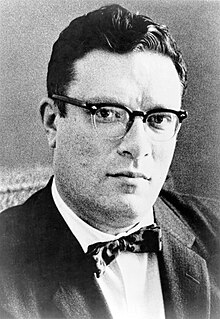
Isaac Asimov was an American writer and professor of biochemistry at Boston University. During his lifetime, Asimov was considered one of the "Big Three" science fiction writers, along with Robert A. Heinlein and Arthur C. Clarke. A prolific writer, he wrote or edited more than 500 books. He also wrote an estimated 90,000 letters and postcards. Best known for his hard science fiction, Asimov also wrote mysteries and fantasy, as well as much nonfiction.

The Three Laws of Robotics are a set of rules devised by science fiction author Isaac Asimov. The rules were introduced in his 1942 short story "Runaround", although they had been foreshadowed in some earlier stories. The Three Laws, quoted from the "Handbook of Robotics, 56th Edition, 2058 A.D.", are:
"Robbie" is a science fiction short story by American writer Isaac Asimov. It was his first robot story and writing commenced on June 10, 1939. It was first published in the September 1940 issue Super Science Stories magazine as "Strange Playfellow", a title that was chosen by editor Frederik Pohl and described as "distasteful" by Asimov. A revised version of "Robbie" was reprinted under Asimov's original title in the collections I, Robot (1950), The Complete Robot (1982), and Robot Visions (1990). "Robbie" was the fourteenth story written by Asimov, and the ninth to be published. The story is also part of Asimov's Robot series, and was the first of Asimov's positronic robot stories to see publication.
"Reason" is a science fiction short story by American writer Isaac Asimov, first published in the April 1941 issue of Astounding Science Fiction and collected in I, Robot (1950), The Complete Robot (1982), and Robot Visions (1990). It is part of Asimov's Robot series, and was the second of Asimov's positronic robot stories to see publication.
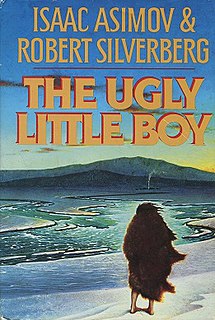
"The Ugly Little Boy" is a science fiction short story by American writer Isaac Asimov. The story first appeared in the September 1958 issue of Galaxy Science Fiction under the title "Lastborn", and was reprinted under its current title in the 1959 collection Nine Tomorrows. The story deals with a Homo neanderthalensis child which is brought to the future by means of time travel. Robert Silverberg later expanded it into a novel with the same title published in 1992.
This is a bibliography of the books written or edited by Isaac Asimov, arranged alphabetically. Asimov was a prolific author, and he engaged in many collaborations with other authors. This list may not yet be complete. The total number of books listed here is over 500. Asimov died in 1992 at age 72; a small number of his books were published posthumously.

"The Last Question" is a science fiction short story by American writer Isaac Asimov. It first appeared in the November 1956 issue of Science Fiction Quarterly and was anthologized in the collections Nine Tomorrows (1959), The Best of Isaac Asimov (1973), Robot Dreams (1986), The Best Science Fiction of Isaac Asimov (1986), the retrospective Opus 100 (1969), and in Isaac Asimov: The Complete Stories, Vol. 1 (1990). It was Asimov's favorite short story of his own authorship, and is one of a loosely connected series of stories concerning a fictional computer called Multivac. The story overlaps science fiction, theology, and philosophy.
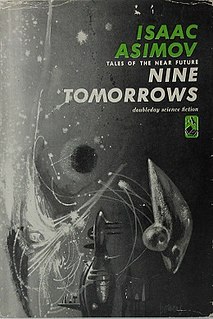
Nine Tomorrows is a collection of nine short stories and two pieces of comic verse by American writer Isaac Asimov. The pieces were all originally published in magazines between 1956 and 1958, with the exception of the closing poem, "Rejection Slips", which was original to the collection. The book was first published in the United States in 1959 and in the UK in 1963. It includes two of Asimov's favorite stories, "The Last Question" and "The Ugly Little Boy".
"The Dead Past" is a science fiction short story by American writer Isaac Asimov, first published in the April 1956 issue of Astounding Science Fiction. It was later collected in Earth Is Room Enough (1957) and The Best of Isaac Asimov (1973), and adapted into an episode of the science-fiction television series Out of the Unknown. Its pattern is that of dystopian fiction, but of a subtly nuanced flavor. It is considered by some people to be one of his best short stories.

The Best Science Fiction of Isaac Asimov, published in 1986, is a collection of 28 short stories by American writer Isaac Asimov, personally selected as favorites by himself.
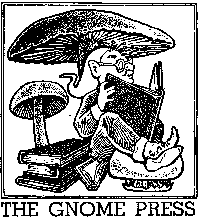
Gnome Press was an American small-press publishing company primarily known for publishing many science fiction classics. Gnome was one of the most eminent of the fan publishers of SF, producing 86 titles in its lifespan — many considered classic works of SF and Fantasy today. Gnome was important in the transitional period between Genre SF as a magazine phenomenon and its arrival in mass-market book publishing, but proved too underfunded to make the leap from fan-based publishing to the professional level. The company existed for just over a decade, ultimately failing due to inability to compete with major publishers who also started to publish science fiction. In its heyday, Gnome published many of the major SF authors, and in some cases, as with Robert E. Howard's Conan series and Isaac Asimov's Foundation series, was responsible for the manner in which their stories were collected into book form.
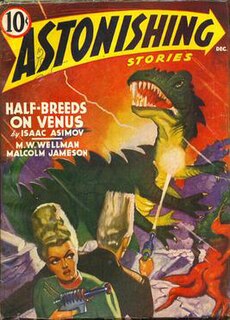
"Half-Breeds on Venus" is a science fiction short story by American writer Isaac Asimov. Asimov was asked by Frederik Pohl, editor of Astonishing Stories, to write a sequel to his earlier Tweenie story "Half-Breed", and he spent April and May 1940 doing so. He submitted the sequel to Pohl on June 3, and Pohl accepted it on the 14th, running it in the December 1940 issue of Astonishing. Asimov subsequently included the story in his 1972 collection The Early Asimov.
"Breeds There a Man...?" is a science fiction short story by American writer Isaac Asimov. It was first published in the June 1951 issue of Astounding and was reprinted in science fiction anthologies such as Beachheads in Space (1952) and The Great SF Stories #13 (1951), as well as in Asimov-only collections such as Through a Glass, Clearly (1967), Nightfall and Other Stories (1969). and Robot Dreams (1986).
"The Author's Ordeal" are lyrics to a song by American author Isaac Asimov. They were first published in Science Fiction Quarterly, May 1957, pp. 34–36. They are included in three collections of Asimov's short stories: Earth Is Room Enough, The Far Ends of Time and Earth and The Complete Stories, Volume 1.

"The Watery Place" is a science fiction short story by American writer Isaac Asimov. It was first published in the October 1956 issue of Satellite Science Fiction and reprinted in the 1957 collection Earth Is Room Enough. It is Asimov's only science fiction story set in Idaho.
"Time Pussy" is an early science fiction short story by American writer Isaac Asimov.
Astonishing Stories was an American pulp science fiction magazine, published by Popular Publications between 1940 and 1943. It was founded under Popular's "Fictioneers" imprint, which paid lower rates than Popular's other magazines. The magazine's first editor was Frederik Pohl, who also edited a companion publication, Super Science Stories. After nine issues Pohl was replaced by Alden H. Norton, who subsequently rehired Pohl as an assistant. The budget for Astonishing was very low, which made it difficult to acquire good fiction, but through his membership in the Futurians, a group of young science fiction fans and aspiring writers, Pohl was able to find material to fill the early issues. The magazine was successful, and Pohl was able to increase his pay rates slightly within a year. He managed to obtain stories by writers who subsequently became very well known, such as Isaac Asimov and Robert Heinlein. After Pohl entered the army in early 1943, wartime paper shortages led Popular to cease publication of Astonishing. The final issue was dated April of that year.
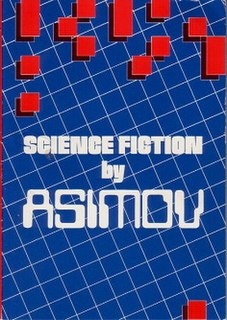
Science Fiction by Asimov is a collection of six short stories and one poem by American author Isaac Asimov. Published by Davis Publications in 1986, it was given away free to subscribers of Asimov's SF Magazine.
Isaac Asimov wrote three volumes of autobiography. In Memory Yet Green (1979) and In Joy Still Felt (1980) were a two-volume work, covering his life up to 1978. The third volume, I. Asimov: A Memoir (1994), published after his death, was not a sequel but a new work which covered his whole life. This third book won a Hugo Award.
Depending on the counting convention used, and including all titles, charts, and edited collections, there may be currently over 500 books in Isaac Asimov's bibliography— as well as his individual short stories, individual essays, and criticism. For his 100th, 200th, and 300th books, Asimov published Opus 100 (1969), Opus 200 (1979), and Opus 300 (1984), celebrating his writing.